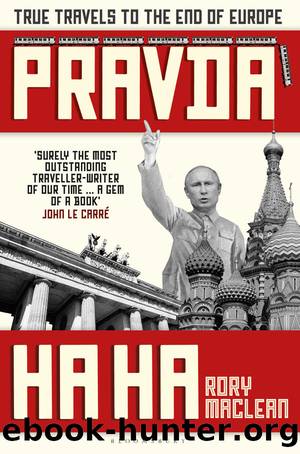Pravda Ha Ha by Rory MacLean

Author:Rory MacLean [MacLean, Rory]
Language: eng
Format: azw3
Publisher: Bloomsbury Publishing
Published: 2019-10-31T16:00:00+00:00
* All Kaliningrad’s public toilets are illuminated with blue light that makes veins undetectable and so prevents local users from injecting themselves.
Transnistria
21
Back in the USSR
Sunlight sparkled off the broad Dniester River. Smugglers’ tracks wound across the virgin snow. Patriotic oligarchs in Adidas tracksuits hunted wild boar with AK-47s. Snowflakes settled on the broad shoulders of Russian ‘peacekeepers’, guarding yet more old Soviet munitions dumps.
It wasn’t my first trip to Transnistria, a breakaway republic of a breakaway republic of the old Soviet Union. A decade ago I spent a month in the banana-shaped, sliver-thin nowhereland. In its capital, Tiraspol, I’d watched young activists train for ‘spontaneous actions’ at the Che Guevara High School of Political Leadership. I’d met geriatric KGB colonels and retired Red Army generals. I’d drunk coffee with the president’s lover, who also served as the country’s foreign minister. I’d even come to know the fate of the ‘father of the republic’ after he’d bought a couple too many S-Class Mercedes.
‘If you get into trouble, we can’t get you out,’ a British diplomat had warned me at the time. Nevertheless I flew back across the continent to return to a place recognised by no country in the world.
I started as I’d begun my first visit, at the headquarters of the Communist Party of Transnistria. A concrete Lenin surveyed the front hall of the two-up-two-down conversion. ‘Iron Felix’ Dzerzhinsky, first chairman of the Cheka and KGB, glowered from his portrait behind the Lavazza coffee machine.
‘The Soviet Union is the place where I was born. It is my Motherland,’ declared chairman Oleg Khorzhan, embracing me like a long-lost brother in arms. Things seemed to be looking up since our last meeting, a new silver Breitling Chronomat sparkling on his wrist. ‘My job as party leader is to preserve – and to carry forward – the positive attributes of the USSR: its power, its social guarantees, its absence of borders and, above all, its belief in tomorrow.’
Since time immemorial (that is, about 200 years) little Transnistria had been part of Greater Russia. But during the Second World War, Stalin had reached west across the Dniester to seize neighbouring Romanian Moldova. He’d tacked it on to Slav Transnistria, creating the Moldavian Soviet Socialist Republic. Thousands of retiring Red Army officers then transformed it into a Bolshevik Costa del Sol, building their dachas along its riverbanks, savouring the balmy southern climate and – as old soldiers everywhere – dreaming of further glories.
Their chance came with the fall of the Berlin Wall. As the Soviet Union splintered, Western-looking Moldova turned its back on its Slavic side. It declared Romanian to be its official language and joined both NATO’s Partnership for Peace and the Council of Europe. In response the Kremlin stepped in ‘to protect Russian minorities’ on the Dniester’s eastern bank, ensuring that the nostalgic military men (and a few wily oligarchs) could retain their links with Moscow.
‘In the upheaval, I saw ordinary civilians shot on the Dubăsari Bridge,’ Khorzhan told me with feeling, naming
Download
This site does not store any files on its server. We only index and link to content provided by other sites. Please contact the content providers to delete copyright contents if any and email us, we'll remove relevant links or contents immediately.
| Africa | Americas |
| Arctic & Antarctica | Asia |
| Australia & Oceania | Europe |
| Middle East | Russia |
| United States | World |
| Ancient Civilizations | Military |
| Historical Study & Educational Resources |
The Sympathizer by Viet Thanh Nguyen(4390)
The Rape of Nanking by Iris Chang(4211)
World without end by Ken Follett(3476)
Ants Among Elephants by Sujatha Gidla(3467)
Blood and Sand by Alex Von Tunzelmann(3203)
Japanese Design by Patricia J. Graham(3174)
The Queen of Nothing by Holly Black(2598)
City of Djinns: a year in Delhi by William Dalrymple(2555)
Foreign Devils on the Silk Road: The Search for the Lost Treasures of Central Asia by Peter Hopkirk(2464)
India's Ancient Past by R.S. Sharma(2454)
Inglorious Empire by Shashi Tharoor(2437)
Tokyo by Rob Goss(2428)
In Order to Live: A North Korean Girl's Journey to Freedom by Yeonmi Park(2391)
Tokyo Geek's Guide: Manga, Anime, Gaming, Cosplay, Toys, Idols & More - The Ultimate Guide to Japan's Otaku Culture by Simone Gianni(2373)
India's biggest cover-up by Dhar Anuj(2354)
The Great Game: On Secret Service in High Asia by Peter Hopkirk(2349)
Goodbye Madame Butterfly(2253)
Batik by Rudolf Smend(2180)
Living Silence in Burma by Christina Fink(2071)
